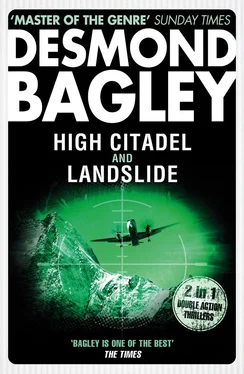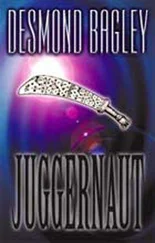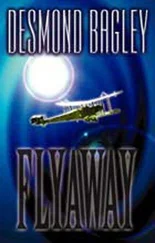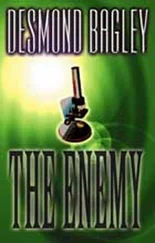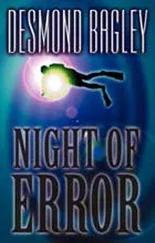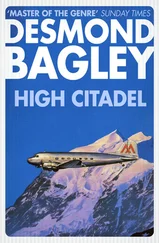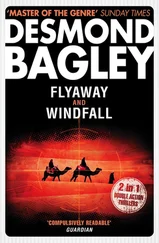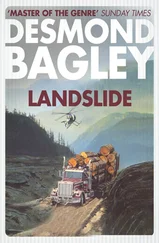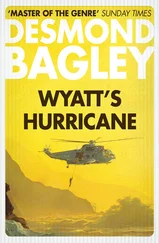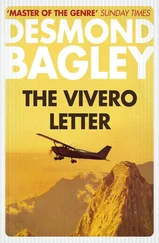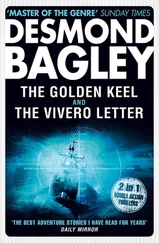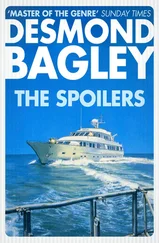‘I know,’ he said. ‘The only thing that makes it bearable is that if you don’t kill, then you are killed. It reduces to a simple choice in the end.’
‘I realize that now, Mr O’Hara,’ she said. ‘I’ll be all right now.’
‘My name is Tim,’ he said. ‘The English are pretty stuffy about getting on to first-name terms, but not we Irish.’
She gave him a tremulous smile. ‘I’m Jennifer.’
‘All right, Jenny,’ said O’Hara. ‘I’ll try not to put you in a spot like that again.’
She turned her head away and said in a muffled voice, ‘I think I’m going to cry.’ Hastily she scrambled to her feet and ran out of the shelter.
Benedetta said from behind O’Hara, ‘That was well done, Tim.’
He turned and looked at her stonily. ‘Was it? It was something that had to be done.’ He got up and stretched his legs. ‘Let’s practise with that crossbow.’
For the rest of the day they practised, learning to allow for wind and the effect of a change of range. Miss Ponsky tightened still further her wire-drawn nerves and became instructress, and the general level of performance improved enormously.
O’Hara went down to the gorge and, by triangulation, carefully measured the distance to the enemy vehicles and was satisfied that he had the range measured to a foot. Then he went back and measured the same distance on the ground and told everyone to practise with the bow at that range. It was one hundred and eight yards.
He said to Benedetta, ‘I’m making you my chief-of-staff – that’s a sort of glorified secretary that a general has. Have you got pencil and paper?’
She smiled and nodded, whereupon he reeled off a dozen things that had to be done. ‘You pass on that stuff to the right people in case I forget – I’ve got a hell of a lot of things on my mind right now and I might slip up on something important when the action starts.’
He set Aguillar to tying bunches of rags around half a dozen bolts, then shot them at the target to see if the rags made any difference to the accuracy of the flight. There was no appreciable difference, so he soaked one of them in paraffin and lit it before firing, but the flame was extinguished before it reached the target.
He swore and experimented further, letting the paraffin burn fiercely before he pulled the trigger. At the expense of a scorched face he finally landed three fiercely burning bolts squarely in the target and observed happily that they continued to burn.
‘We’ll have to do this in the day-time,’ he said. ‘It’ll be bloody dangerous in the dark – they’d spot the flame before we shot.’ He looked up at the sun. ‘Tomorrow,’ he said. ‘We’ve got to drag this thing out as long as we can.’
It was late afternoon before the enemy ventured on to the bridge again and they scattered at a shot from Rohde who, after a long sleep, had taken over again from Forester. Rohde fired another shot before sunset and then stopped on instructions from O’Hara. ‘Keep the last two bullets,’ he said. ‘We’ll need them.’
So the enemy put in three more planks and stepped up their illumination that night, although they dared not move on the bridge.
Forester awoke at dawn. He felt refreshed after having had a night’s unbroken sleep. O’Hara had insisted that he and Rohde should not stand night watches but should get as much sleep as they could. This was the day that he and Rohde were to go up to the hutted camp to get acclimatized and the next day to go on up to the mine.
He looked up at the white mountains and felt a sudden chill in his bones. He had lied to O’Hara when he said he had mountaineered in the Rockies – the highest he had climbed was to the top of the Empire State Building in an elevator. The high peaks were blindingly bright as the sun touched them and he wrinkled his eyes to see the pass that Rohde had pointed out. Rohde had said he would be sorry and Forester judged he was right; Rohde was a tough cookie and not given to exaggeration.
After cleaning up he went down to the bridge. Armstrong was on watch, lying on his back beneath the mirror. He was busy sketching on a scrap of paper with a pencil stub, glancing up at the mirror every few minutes. He waved as he saw Forester crawling up and said, ‘All quiet. They’ve just switched off the lights.’
Forester looked at the piece of paper. Armstrong had drawn what looked like a chemist’s balance. ‘What’s that?’ he asked. ‘The scales of justice?’
Armstrong looked startled and then pleased. ‘Why, sir, you have identified it correctly,’ he said.
Forester did not press it further. He thought Armstrong was a nut – clever, but still a nut. That crossbow of his had turned out to be some weapon – but it took a nut to think it up. He smiled at Armstrong and crawled away to where he could get a good look at the bridge.
His mouth tightened when he saw how narrow the gap was. Maybe he wouldn’t have to climb the pass after all; maybe he’d have to fight and die right where he was. He judged that by the afternoon the gap would be narrow enough for a man to jump and that O’Hara had better prepare himself for a shock. But O’Hara had seemed untroubled and talked of a plan, and Forester hoped to God that he knew what he was doing.
When he got back to the rock shelter he found that Willis had come down from the hutted camp. He had hauled a travois the whole way and it was now being unpacked. He had brought more food, some blankets and another crossbow which he was demonstrating to O’Hara.
‘This will be faster loading,’ he said. ‘I found some small gears, so I built them into the windlass – they make the cranking a lot easier. How did the other bow work?’
‘Bloody good,’ said O’Hara. ‘It killed a man.’
Willis paled a little and the unshaven bristles stood out against his white skin. Forester smiled grimly. The backroom boys always felt squeamish when they heard the results of their tinkering.
O’Hara turned to Forester. ‘As soon as they start work on the bridge we’ll give them a surprise,’ he said. ‘It’s time we put a bloody crimp in their style. We’ll have breakfast and then go down to the bridge – you’d better stick around and see the fun; you can leave immediately afterwards.’
He swung around. ‘Jenny, don’t bother about helping with the breakfast. You’re our star turn. Take a crossbow and have a few practice shots at the same range as yesterday.’ As she paled, he smiled and said gently, ‘We’ll be going down to the bridge and you’ll be firing at a stationary, inanimate target.’
Forester said to Willis, ‘Where’s Peabody?’
‘Back at the camp – making more arrows.’
‘Have any trouble with him?’
Willis grinned briefly. ‘He’s a lazy swine but a couple of kicks up the butt soon cured that,’ he said, unexpectedly coarsely. ‘Where’s Armstrong?’
‘On watch down by the bridge.’
Willis rubbed his chin with a rasping noise. ‘That man’s got ideas,’ he said. ‘He’s a whole Manhattan Project by himself. I want to talk to him.’
He headed down the hill and Forester turned to Rohde, who had been talking to Aguillar and Benedetta in Spanish. ‘What do we take with us?’
‘Nothing from here,’ Rohde said. ‘We can get what we want at the camp; but we must take little from there – we travel light.’
O’Hara looked up from the can of stew he was opening. ‘You’d better take warm clothing – you can have my leather jacket,’ he offered.
‘Thanks,’ Forester said.
O’Hara grinned. ‘And you’d better take your boss’s vicuna coat – he may need it. I hear it gets cold in New York.’
Читать дальше
